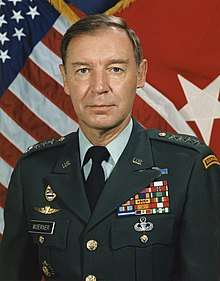Frederick F. Woerner Jr.
Frederick F. Woerner Jr. is a retired four-star general of the United States Army, former Commander-in-Chief of United States Southern Command, former Chairman of the American Battle Monuments Commission, and Professor Emeritus of Boston University.
Frederick F. Woerner Jr. | |
|---|---|
 General Frederick F. Woerner Jr. | |
| Born | August 12, 1933 Philadelphia, Pennsylvania |
| Allegiance | |
| Service/ | |
| Years of service | 1955-1989 |
| Rank | |
| Commands held | U.S. Southern Command U.S. Sixth Army 193rd Infantry Brigade 3rd Basic Combat Brigade 1st Battalion, 6th Infantry Regiment |
| Battles/wars | Vietnam War |
| Awards | United States and Foreign Military Awards and Decorations are noted below |
| Other work | Professor, Boston University Chairman, American Battle Monuments Commission |
Education
- 1955: U.S. Military Academy – Bachelor of Science degree
- 1959: Defense Language Institute
- 1964: U.S. Army Command and General Staff College
- 1965: University of Arizona – Master of Arts degree in Latin American History
- 1969: Uruguayan Military Institute of Superior Studies
- 1973: U.S. Army War College
Military career
He was a commissioned officer in the U.S. Army from 1955 to 1989. He graduated from the United States Military Academy, West Point, New York and was commissioned second lieutenant of Infantry. He qualified as a parachutist and as a Ranger.
He pursued a military career divided between traditional infantry assignments and duties associated with Latin America. He commanded infantry units at platoon, company, battalion, and brigade levels and served on staffs at every echelon up through the U.S. Army General Staff.
He spent a year in study and travel in the northern countries of South America. He advised the Guatemalan government on the use of military forces in socio-economic development, attended the Uruguayan Military Institute of Superior Studies, served as director of Latin American studies at the U.S. Army War College. He served as the commanding general of the United States Sixth Army from 1986 through 1987, responsible for the readiness for mobilization of all Army National Guard forces and U.S. Army Reserve units in the twelve western states.[1] His final position was as commander-in-chief of U.S. Southern Command from 1987 through 1989, responsible for mission performance, training, and welfare of all Department of the Army personnel in Central America, Panama, and South America.[2] In that position he was the senior U.S. military officer responsible for strategy development and military policy execution in support of U.S. national objectives in Central America, Panama, and South America. He provided leadership to an organization consisting of over 30,000 military and civilian employees, located in 17 countries, and provided for the well being of the employees and their 40,000 family members. He retired as a general.[3]
Civilian employment
From 1990 to 2003 he was a Professor of International Relations at Boston University. He was a tenured full professor teaching in the Department of International Relations, College of Arts and Sciences. He taught courses addressing U.S. national security and Latin America.[3]
Public service
1994 to 2001: He was appointed by the President in 1994 to serve as Chairman of the American Battle Monuments Commission. In that capacity, he has overseen the development of the WW II memorial in Washington, DC.[4] He was also responsible for commemorating the services of the armed forces through the management of 24 military burial grounds and 28 monuments/markers located worldwide, and the construction of new memorials.
He served as senior executive for the completion of the project to build the congressionally mandated World War II Memorial on the National Mall in Washington, DC, including design, private fund raising, construction, and dedication.
United States and foreign military awards and decorations
Department of Defense Distinguished Service Medal, Department of the Army Distinguished Service Medal with one Oak Leaf Cluster, Legion of Merit with two Oak Leaf Clusters, Bronze Star with one Oak Leaf Cluster, Meritorious Service Medal, Air Medal, Army Commendation Medal, National Defense Service Medal with one Oak Leaf Cluster, Armed Forces Expeditionary Medal, Army Service Ribbon with numeral five, Vietnam Service Medal with four Bronze Stars, Argentine Order of May of Military Merit (Grand Officer Grade), El Salvadoran Gold Medal for Merit, El Salvadoran Gold Medal for Distinguished Service, Guatemalan Cross of Military Merit First Class, Honduran Armed Forces Cross, Panamanian Distinguished Service Medal, Venezuelan Star of Carabobo, Vietnam Cross of Gallantry with Gold Star, U.S. Combat Infantryman Badge, Master Parachutist Badge, Ranger Tab, Army General Staff Badge, Ecuadorian Parachutist Badge, Guatemalan Parachutist Badge, Honduran Parachutist Badge, Panamanian Parachutist Badge, Paraguayan Parachutist Badge, and Uruguayan General Staff Badge.
Post-retirement activities and recognitions
- Member of the Council on Foreign Relations
- Associate of the Inter-American Dialogue
- Distinguished Fellow of the U.S. Army War College
- Award of Merit, The Penn Charter Alumni Society
- Order of Saint Maurice, Rank of Primicerius, (National Infantryman’s Association)
References
- "Reagan Picks Chief of Staff, Region Commander for Army". Washington Post. April 2, 1987. Retrieved 20 March 2013.
- Halloran, Richard (July 21, 1989). "U.S. Military Chief Is Replaced In the Central American Region". New York Times. Retrieved 20 March 2013.
- "Faculty page". Boston University. Retrieved 20 March 2013.
- http://www.a-1-6.org/1-6th%20site/1st%20bn%206th%20inf%20web%20site%20off%20line/cdLTCWoerner.html. Missing or empty
|title=(help)